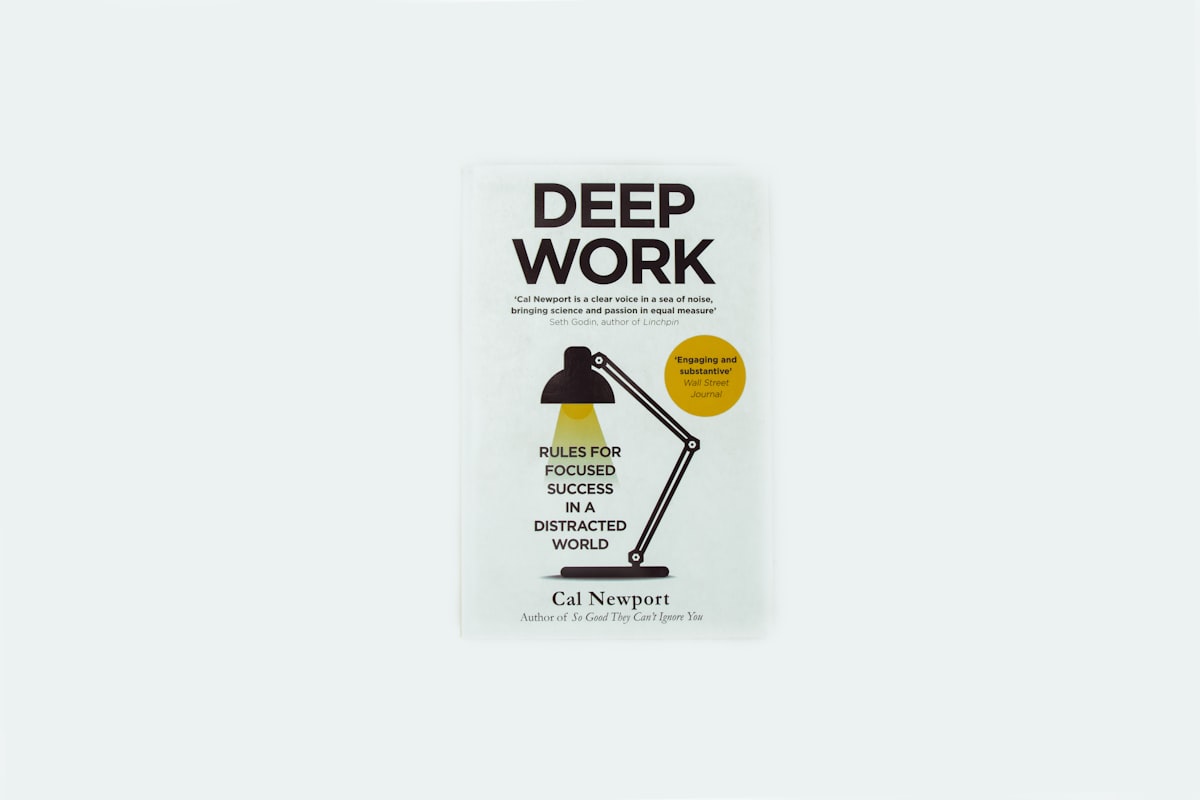Deep Work
A summary of Deep Work, by Cal Newport.

Earlier this month, I read Deep Work, by Cal Newport. The book argues that deep work, a state of working in concentration free of distraction, is key to thriving in the modern economy and deriving meaning in life. The latter half of the book offers practical advice on how to apply deep work in one’s life.
I found this title through the recommendation of coworkers. The content seemed to be relevant to me. As a software engineer, my work revolves around “building,” and my best work happens when I’m concentrated. As a corollary, distractions really diminish my ability to produce good output. To my delight, the writing in this book is remarkably clean and well-organized.
In this post, I summarize the contents of the book. While the book mainly targets those working in high-skill jobs, most people can derive value from its teachings in their professional or personal life.
Definition of Deep Work
Upon starting the book, we’re introduced to the term “deep work” and explore its contribution towards the success of modern knowledge workers and influential thinkers in the past.
Deep Work: Professional activities performed in a state of distraction-free concentration that push your cognitive capabilities to their limit. These efforts create new value, improve your skill, and are hard to replicate.
Examples of deep work can be
- writing a book/thesis,
- conducting research, and
- developing a software app or business strategy.
Inversely, people can also do shallow work.
Shallow Work: Noncognitively demanding, logistical-style tasks, often performed while distracted. These efforts tend to not create much new value in the world and are easy to replicate.
Shallow work tends to be “simpler” tasks, such as
- checking email,
- posting on social media, or
- attending meetings.
Cal Newport packages these phenomena into his central thesis:
The Deep Work Hypothesis: The ability to perform deep work is becoming increasingly rare at exactly the same time it is becoming increasingly valuable in our economy. As a consequence, the few who cultivate this skill, and then make it the core of their working life, will thrive.
This thesis breaks into three claims.
- Deep work is valuable.
- Deep work is rare.
- Deep work is meaningful (i.e. those who practice it will thrive).
The first part of this book dedicates a chapter to each of these claims.
Deep Work is Valuable
The winners of the modern economy fall into three buckets.
- High-skilled workers adapt to rapidly changing advances in society and learn the necessarily skills to handle new complex tasks. While new technology automates away the majority of low-skilled jobs, these people thrive in the face of evolving technology.
- Superstars lie on the upper end of the bell curve when it comes to their craft. The market resembles more of a long tail distribution (think “winner-takes-all”) since talent cannot being gathered in bulk and combined arithmetically. There’s a premium to being the best.
- The owners simply have access to capital. Modern technology has minimized the recurring costs of labor. They invest in intelligent machines and growing industries, which compound their wealth over time.
So how do you become a winner? Being in the third bucket already assumes you have capital, creating a chicken and egg problem, so that’s out of scope. To enter either of the other two groups, you need two core abilities that depend on your ability to perform deep work.
- The ability to quickly master hard things.
- The ability to produce at an elite level, in terms of both quality and speed.
Deep work helps you learn hard things quickly. Getting good at hard skills requires deliberate practice. Deliberate practice has two components:
- your attention is tightly focused on the specific skill, and
- you receive feedback so you can adjust your approach (and where you direct your attention).
Producing the most high-quality work obeys the following equation:
High-Quality Work Produced = (Time Spent) * (Intensity of Focus)
Time is limited. Thus the variable we adjust is how well we leverage that time. Using your time for deep work raises the value of your output by orders of magnitude.
Note that deep work isn’t the only important skill in the economy. For example, being distracted is literally the job for CEOs and people managers; they’ll rarely have time for deep work. But unless there’s a compelling reason to be distracted in your work, it’s probably best not to look for distractions.
Deep Work is Rare
Modern trends in the workplace have diminished our ability to perform deep work. Open offices expose workers to serendipity, while journalists are encouaged to use Twitter to promote their brand. However, there’s an opportunity cost (i.e. lack of concentration time) to these changes that might outweigh the benefits.
It’s difficult to measure modern productivity. As a result, organizations don’t know to promote deep work, and workers fall victim to biases that undercut their productivity.
When there’s no obvious metric to steer people in the correct direction, we naturally gravitate towards whatever’s easiest to work on. The easiest thing in the moment tends to be shallow work, so we naturally stray away from deep work due to a higher barrier of entry. This is known as the principle of least resistance.
The Principle of Least Resistance: In a business setting, without clear feedback on the impact of various behaviors to the bottom line, we will tend towards behaviors that are easiest in the moment.
Knowledge workers want to be productive, but good intentions can lead them astray. Because it’s hard to measure modern productivity, there’s a tendency to digress towards older measures of productivity, namely busyness. It’s not an unreasonable train of thought, but being busy does not imply productivity.
Busyness as Proxy for Productivity: In the absence of clear indicators of what it means to be productive and valuable in their jobs, many knowledge workers turn back toward an industrial indicator of productivity: doing lots of stuff in a visible manner.
Deep Work is Meaningful
From a philosophical standpoint, deep work cultivates a more meaningful life. I personally find the points in this chapter a bit more dubious, but here are some interesting points about how deep work generates meaning in our lives.
Your world is the outcome of what you pay attention to. People feel a sense of importance in deep work. Hence by spending enough time in deep work, your mind sees your world as rich in meaning and importance. By proxy, your mind filters out the meaningless noise in the world, which is also nice.
Additionally, doing deep work brings people into a mental state called flow. Some refer to this as “being in the zone.” Although people assume relaxation makes them happier than being in a state of working, the opposite is empirically true. “Human beings, it seems, are at their best when immersed deeply in something challenging.”
The last argument states that deep work is necessary to cultivate craftsmanship, which in turn cultivates a sense of purpose. This claim builds off of the explorations of the book All Things Shining. After the Enlightenment, humans discovered nihilism and struggled to find purpose in their lives. The book concludes through craftsmanship, one cultivates the skill of discerning meaning that already exists in the world.
How to Embrace Deep Work
The second part of Deep Work teaches readers how to train themselves to place deep work at the core of their lives. The book provides us four rules to follow, each having a dedicated chapter.
Work Deeply
Wanting to do deep work will likely fail. Good intentions are falliable because humans have a finite amount of willpower. Hence you need to be strategic. The key to developing a good habit is to move beyond intentions and add routines and rituals, which minimize the willpower necessary to keep unbroken concentation. The chapter covers six practical strategies.
Decide on Your Depth Philosophy
There are multiple strategies for scheduling deep work. Pick one that works for you.
- Monastic: Maximize deep efforts by eliminating or radically minimizing shallow obligations. This is akin to living like a monk.
- Bimodal: Divide your time, dedicating some clearly defined stretches to deep work and leaving the rest open to everything else. You’ll end up having chunks of deep work time, and chunks of normal time.
- Rhythmic: Make a regular habit of starting deep work sessions. They don’t need to be long sessions. You won’t need to invest energy to decide if and when to start a session of deep work.
- Journalistic: Fit deep work wherever you can into your schedule; be ready on a moment’s notice. This is the hardest philosophy to implement.
Ritualize
Form rituals to minimize the friction of starting and maintaining deep work sessions. The specific ritual many vary, but it should address the following questions:
- Where you’ll work and for how long: Associating a location with deep work creates a positive effect, and limiting time keep the session a discrete challenge.
- How you’ll work once you start to work: Make it clear what you should and should not be doing, so your brain doesn’t wonder if you’re working sufficiently hard.
- How you’ll support your work: Having the right resources (e.g. food for energy or work materials) will keep you working at full potential.
Make Grand Gestures
A radical change in environment (usually at the price of some investment of effort or money) can increase the perceived importance of a task. Such a mentality shift reduces the temptation to procrastinate while injecting motivation and energy. By making gestures that raise the mental priority of a task, you are induced to provide more mental resources to a task.
Don’t Work Alone
Working with someone else may yield better results than working alone due to a whiteboard effect: the existence of another party waiting for your progress can motivate better work. As a caveat, it’s important to keep serendipitous encounters (i.e. learning from others but not in a deep work context) and deep work compartmentalized. They detract from each other if done at the same time.
Execute Like a Business
To execute a deep work session well, we look towards four disciplines that businesses use when executing a strategy.
- Focus on the Wildly Important. Lower priority goals cannibalize energy spent on important goals.
- Act on the Lead Measures. Optimize for metrics that you can observe before the final outcome is set in stone. Other “lag measures” aren’t actionable, if you can only observe them after a project has concluded.
- Keep a Compelling Scoreboard. Measure your time spent and your outcomes. It will motivate you and help you calibrate on how much resources you’ll need to devote to work.
- Create a Cadence of Accountability. Periodically review your performance and set future improvement goals. Having retrospectives makes sure that your processes will eventually work.
Be Lazy
Ironically, having regular leisure time and substantial freedom is required to get your best work done. After work, disconnect completely. If you need to do more work, then extend your work day, but once you leave work, stop thinking about work.
- Downtime Aids Insights. As per unconscious thought theory, when freeing up your brain’s “CPU cycles,” you provide resources for your brain to index its subconcious thoughts in the background.
- Downtime Helps Recharge the Energy Needed to Work Deeply. Your directed attention is finite. Exhausting it means nothing gets done well. It takes a certain threshold of deeper relaxation to recharge your attention. Interestingly enough, walking through nature can be extremely effective in recharging.
- The Work That Evening Downtime Replaces Is Usually Not That Important. Research on deliberate practice suggests that your capacity for deep work in a day is approximately four hours. By the end of work, you should have reached that capacity.
Mentally accept that once work is done, you don’t get involved at all. Having a shutdown ritual where you “tie up loose ends” by making next-day plans for incomplete tasks can help avoid the Zeigarnik effect.
When you work, work hard. When you’re done, be done.
Embrace Boredom
Being able to concentrate deeply is a skill, not a habit. Thus you have to train your ability to concentrate. (As a corollary, you must teach your mind not to fear boredom.)
Once your brain has become accustomed to on-demand distraction…it’s hard to shake the addiction even when you want to concentrate.
Like with the first rule, there are strategies that will help increase one’s limits of concentation ability.
Don’t Take Breaks from Distraction. Instead Take Breaks from Focus.
Explicitly schedule time to allow yourself to be distracted. The goal is to remove is the frequent context switching between deep and shallow activities. You strengthen your ability to focus when filtering out distractions during concentration time and minimizing the number of times you context switch.
A modern example is to schedule offline blocks where Internet usage is prohibited. A few points to note:
- This strategy works even if your job requires lots of Internet use and/or prompt e-mail replies.
- Regardless of how you schedule your Internet blocks, you must keep the time outside these blocks free from Internet use.
- Scheduling Internet use at home as well as at work can further improve your concentration training.
The main takeaway here is to be strict during offline blocks; it’s fine if these blocks are short and rare. Fight through the boredom.
Work Like Teddy Roosevelt
Theodore Roosevelt had a wide array of interests during college and managed to stay active with all of them while doing well in class. He had limited time left for schoolwork, but Roosevelt made due with it by studying with great intensity.
For any high priority deep task, estimate the normal time taken to complete the task and give yourself a hard deadline that’s less than your estimate. Commit to the deadline publicly if possible. Such situations force you to do your best work and removes room for slacking. Such a habit can colloquially compared to “lighting a fire under your ass.”
Meditate Productively
Try productive meditation: take a period where you’re occupied physically but not mentally. During that time, focus your attention on a single well-defined problem. For example, while on a walk, you can think about refining a business strategy. Cal Newport offers two suggestions to help with productive meditation:
- Be Wary of Distractions and Looping. Force yourself to focus if you lose attention. Notice when your thoughts are looping, or aren’t making meaningful progress. Try to break out of the loop in such cases.
- Structure Your Deep Thinking. Break down your main problem into subproblems, identify next steps, and review your progress occasionally.
Memorize a Deck of Cards
The biggest difference between memory athletes and normal humans isn’t memory but rather ability to control one’s attention. Hence training your memory will contribute to your general ability to concentrate. I won’t discuss the specifics of how to memorize a deck of cards, but here’s a tutorial that goes through the same process described in the book
Note that there’s nothing special about memorizing cards; any other challenge with the same level of cognitive requirements will suffice. The key is to train the mind to go through a challenging task.
Your ability to concentrate is only as strong as your commitment to train it.
Quit Social Media
Social media isn’t inherently evil, but its usage comes with a heavy opportunity cost that most people overlook. Network tools may be critical for the success and happiness of some, but they also eat up large amounts of time and attention. Social media clearly adds value, which is enough justification for most people, since they take an any-benefit approach to selection.
The Any-Benefit Approach to Network Tool Selection: You’re justified in using a network tool if you can identify any possible benefit to its use, or anything you might possibly miss out on if you don’t use it.
You should instead take a craftsman approach. Rather than seeing only benefits of a tool, weigh both the pros and cons of adopting a tool. Only use a tool if the benefits outweigh the costs.
The Craftsman Approach to Tool Selection: Identify the core factors that determine success and happiness in your professional and personal life. Adopt a tool only if its positive impacts on these factors substantially outweight its negative impacts.
Putting the craftsman approach into practice isn’t easy, so there are three strategies to help with the process.
Apply the Law of the Vital Few to Your Internet Habits
The Law of the Vital Few: In many settings, 80 percent of a given effect is due to just 20 percent of the possible causes.
Figure out the most important goals in your life and list out key activities that contribute to those goals. Remember that the top few activities will make up the majority of the progress towards your goals. In contrast most other activities will contribute a relatively small amount. However, they all eat up the same amount of time and resources, meaning lower valued activities may not be work doing in the first place.
Quit Social Media
Experiment with cutting out various social media services from your life for a non-trivial period of time. Afterwards, reflect on the impact of your cleansing. Was your life significantly worse? Did people even notice that you were gone? If neither were true, cut out the service permanently.
Don’t Use the Internet to Entertain Yourself
Your weekday hours outside of work should be just as prominent as your working hours. Most people incorrectly view the time before and after work as a prologue and epilogue of the day. You should and can make deliberate use of your time outside of work. Unfortunately, social media is a fast and easy way to be entertained after work, so you can burn away your non-working hours really easily.
Fortunately, Arnold Bennett identified the solution to this problem a hundred years earlier: Put more thought into your leisure time. In other words… when it comes to your relaxation, don’t default to whatever catches your attention at the moment, but instead dedicate some advance thinking to the question of how you want to spend your “day within a day.”
Figure out beforehand what you want to do with your evenings and weekends. Structured hobbies are a good idea, as is having a reading schedule. Having something meaningful to do all the time prevents cheap distractions from capturing your attention. It also contributes more meaning into your life.
Drain the Shallows
Shallow work appears more important that it really is, and typically has a higher opportunity cost than initially perceived. The key idea here is to keep your shallow work levels under control such that you can reap the maximal benefits of deep work for the day.
Schedule Every Minute of Your Day
Most people run on autopilot and fail to give much though to how they spend their time. Don’t be like that. Before your day starts, divide the hours you have into blocks dedicated to given activities. It’s fine to have blocks for meals or breaks, and small tasks can be batched into a single block. Your estimates will be off, and unexpected interruptions can appear. But that’s okay. Re-adjust as necessary and schedule overflow time to keep your scheduling robust.
Quantify the Depth of Every Activity
Every single activity has some inherent value per unit time spent. Bias your time towards those that have the highest leverage with respect to your return on (time) investment. It’s important to also recognize that if you aren’t critical to a task, it’s probably of lesser importance to you.
Ask Your Boss for a Shallow Work Budget
Estimate how much of your time should be spent on shallow work. Ask your boss the same question and converge on a specific answer. Then stick to that budget. This strategy makes sure that you don’t abandon your core obligations that happen to be shallow work. On the other hand, it forces you to put a hard limit on the amount of time you devote to shallow work. You figure out this budget with your boss in order to get support from your workplace and alignment with your core responsibilities.
Finish Your Work by Five Thirty
Fix a time where you will end your work. Reverse engineer how you need to spend your time in order to accomplish your goals for the day. This forces you to set hard caps on the shallow parts of work. On a tactical level, learn to say “no” to requests that don’t make good use of your time. You do not need to justify yourself to the requester.
It’s possible to accomplish more with less time. Aggressively cull out the shallow work while investing thought into organizing good habits and schedules. When you have fewer hours you spend them more wisely.
Become Hard to Reach
Email (and other forms of messaging) can easily claim one’s attention. However, there are tactics you can employ to keep control over such mediums.
- Make People Who Send You Email Do More Work. Make yourself less available if possible and set the expectation that you may not necessarily reply if messaged. As a result, you can filter out uninteresting emails or pings. Now there’s more onus on the senders to make sure their messages are important.
- Do More Work When You Send or Reply to Emails. Opt to minimize the number of round-trip iterations when communicating. When responding to pings, identify the “project” discussed in the message and an actionable process to get the desired outcome. By listing out the project, you synchronize on what task you’re trying to solve. By defining and executing action items, you make real progress on the project.
- Don’t Respond. Ignore pings that are not worth your time. Good ways to judge that include whether the message makes sense, whether it’s interesting to you, and whether ignoring it would have consequences. It may be uncomfortable at first, but this is okay.
Develop the habit of letting small bad things happen. If you don’t you’ll never find time for the life-changing big things.



Comments ()